The ACM A. M. Turing Award is an annual prize given by the Association for Computing Machinery (ACM) for contributions of lasting and major technical importance to computer science. It is generally recognized as the highest distinction in computer science and is colloquially known as or often referred to as the "Nobel Prize of Computing".

The School of Computer Science (SCS) at Carnegie Mellon University in Pittsburgh, Pennsylvania, US is a school for computer science established in 1988. It has been consistently ranked among the top computer science programs over the decades. As of 2022 U.S. News & World Report ranks the graduate program as tied for second with Stanford University and University of California, Berkeley. It is ranked second in the United States on Computer Science Open Rankings, which combines scores from multiple independent rankings.
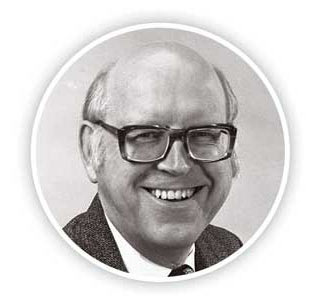
Allen Newell was an American researcher in computer science and cognitive psychology at the RAND Corporation and at Carnegie Mellon University's School of Computer Science, Tepper School of Business, and Department of Psychology. He contributed to the Information Processing Language (1956) and two of the earliest AI programs, the Logic Theory Machine (1956) and the General Problem Solver (1957). He was awarded the ACM's A.M. Turing Award along with Herbert A. Simon in 1975 for their basic contributions to artificial intelligence and the psychology of human cognition.

Alan Jay Perlis was an American computer scientist and professor at Purdue University, Carnegie Mellon University and Yale University. He is best known for his pioneering work in programming languages and was the first recipient of the Turing Award.

The Department of Computer Science at the University of Manchester is the longest established department of Computer Science in the United Kingdom and one of the largest. It is located in the Kilburn Building on the Oxford Road and currently has over 800 students taking a wide range of undergraduate and postgraduate courses and 60 full-time academic staff.

The School of Informatics is an academic unit of the University of Edinburgh, in Scotland, responsible for research, teaching, outreach and commercialisation in informatics. It was created in 1998 from the former department of artificial intelligence, the Centre for Cognitive Science and the department of computer science, along with the Artificial Intelligence Applications Institute (AIAI) and the Human Communication Research Centre.
Robin Oliver Gandy was a British mathematician and logician. He was a friend, student, and associate of Alan Turing, having been supervised by Turing during his PhD at the University of Cambridge, where they worked together.
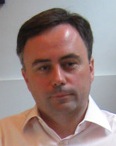
John Graham-Cumming is a British software engineer and writer best known for starting a successful petition to the Government of the United Kingdom asking for an apology for its persecution of Alan Turing. UK Prime Minister Gordon Brown issued the apology in September 2009.As of 2020, Graham-Cumming serves as Chief Technology Officer at Cloudflare; previously he co-founded Electric Cloud.
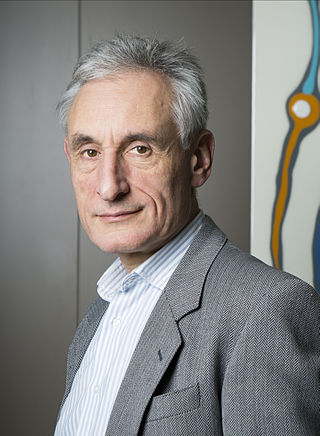
Andrew Blake FREng, FRS, is a British scientist, former laboratory director of Microsoft Research Cambridge and Microsoft Distinguished Scientist, former director of the Alan Turing Institute, Chair of the Samsung AI Centre in Cambridge, honorary professor at the University of Cambridge, Fellow of Clare Hall, Cambridge, and a leading researcher in computer vision.
Geoff C. Tootill was an electronic engineer and computer scientist who worked in the Electrical Engineering Department at the University of Manchester with Freddie Williams and Tom Kilburn developing the Manchester Baby, "the world's first wholly electronic stored-program computer".
The Alan Turing Year, 2012, marked the celebration of the life and scientific influence of Alan Turing during the centenary of his birth on 23 June 1912. Turing had an important influence on computing, computer science, artificial intelligence, developmental biology, and the mathematical theory of computability and made important contributions to code-breaking during the Second World War. The Alan Turing Centenary Advisory committee (TCAC) was originally set up by Professor Barry Cooper
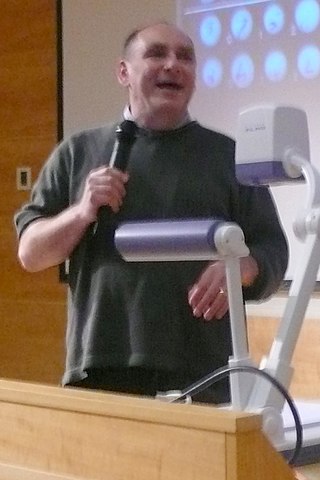
Jonathan Andrew Crowcroft is the Marconi Professor of Communications Systems in the Department of Computer Science and Technology, University of Cambridge and the chair of the programme committee at the Alan Turing Institute.

The Alan Turing Institute is the United Kingdom's national institute for data science and artificial intelligence, founded in 2015 and largely funded by the UK government. It is named after Alan Turing, the British mathematician and computing pioneer.

Andrei Anatolievič Voronkov is a Professor of Formal methods in the Department of Computer Science at the University of Manchester.
Bernard Richards is a British computer scientist and an Emeritus Professor of Medical Informatics at the University of Manchester, England.

Turochamp is a chess program developed by Alan Turing and David Champernowne in 1948. It was created as part of research by the pair into computer science and machine learning. Turochamp is capable of playing an entire chess game against a human player at a low level of play by calculating all potential moves and all potential player moves in response, as well as some further moves it deems considerable. It then assigns point values to each game state, and selects the move resulting in the highest point value.
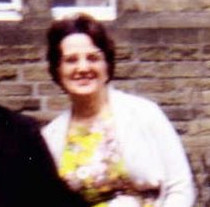
Cicely Mary Williams 29 October 1920 – 20 June 1995 was a British software engineer who worked with Alan Turing on the Manchester Mark 1 computer.

Alan Turing was an English mathematician, computer scientist, logician, cryptanalyst, philosopher, and theoretical biologist. He left an extensive legacy in mathematics, science, society and popular culture.
Maria-Florina (Nina) Balcan is a Romanian-American computer scientist whose research investigates machine learning, algorithmic game theory, theoretical computer science, including active learning, kernel methods, random-sampling mechanisms and envy-free pricing. She is an associate professor of computer science at Carnegie Mellon University.













